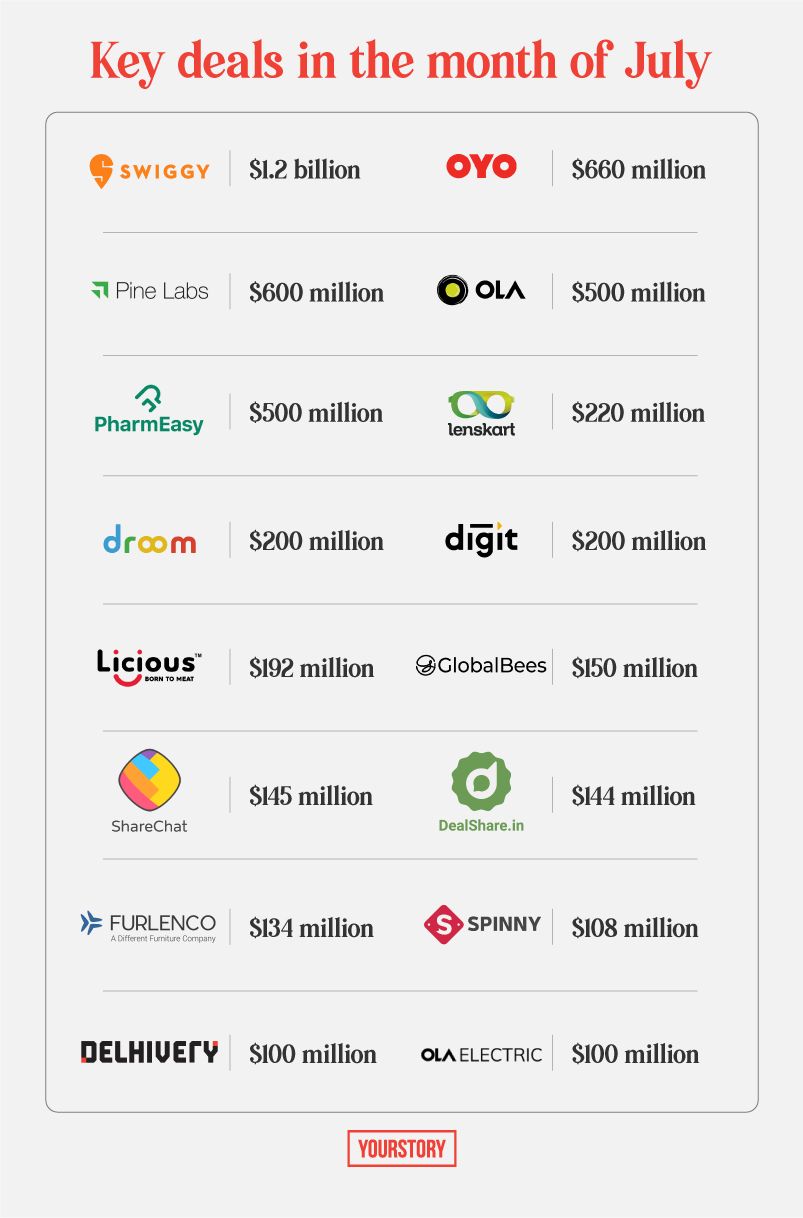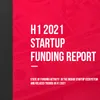The month of July was seminal for the Indian startup ecosystem in more than one way as the capital inflow touched $6 billion, which is 60 percent of the amount raised in the first six months of the year.
Then, three new unicorns — Blackbuck, Droom, and OfBusiness — were added, and Zomato became the first Indian unicorn to go public.
YourStory Research revealed that Indian startups raised $6 billion across 141 deals. This includes $5.2 billion in equity funding, $787 million in debt, and $159 million in equity and debt combined. Walmart-owned Flipkart also raised a mega-round of $3.6 billion from multiple investors, bringing the total close to $10 billion.
In contrast, the first six months of 2021 saw $10.1 billion in funding, while startups raised $9.4 billion in 2020, according to YourStory Research.
This set a new benchmark for the ecosystem, paving the way for a record year of capital inflow.
Anand Lunia, Founding Partner, India Quotient, says, “Zoom-call investing is much faster than in-person. That explains, in part, the $5 billion.”

Top deals
A confluence of factors has paved the way for the high volume of capital inflow into the Indian startup ecosystem.
V Balakrishnan, Chairman, Exfinity Venture Partners, says, “Worldwide, there is a huge amount of liquidity searching for yields. The recent events in China have turned the focus on India as the country has a similar profile, reach with valuations playing its role.”
He adds that the successful public listing of Zomato has also given renewed confidence to investors that India can provide good exits.
The underlying theme of the capital inflow has been the India story and its increased pace of digitisation, proving to be attractive for both investors and tech entrepreneurs.
The deal of the month was $1.2 billion raised by foodtech unicorn Swiggy, which is fiercely competing against Zomato that was listed on July 23.
Other top deals were raised largely by unicorns like Ola, OYO, Lenskart, ShareChat, Pine Labs, Digit Insurance, Delhivery, and PharmEasy.
July also saw some very deals in the social commerce and Thrasio-oriented startups. Dealshare raised $144 million while Global Bees raised $150 million. Investors expect these segments to gain stronger traction in the near future.
It is also heartening to see that of the 133 deals, 104 were in the early stage, signalling that good exits are available for the smaller funds that have invested in these young startups.

Rise across stages and sectors
The industry has seen a massive uptick since April, which saw $3.5 billion raised across 94 deals. KPMG, in its recent Venture Pulse report for the second quarter of 2021, noted that VC investments in India soared past the previous record high set in Q4’19, driven not only by VC investors but also by more traditional funds feeling a sense of FOMO given the broad applicability of digital business models in the pandemic.
Nitish Poddar, Partner and National Leader - Private Equity, KPMG in India, said, “We have seen more and more tech-enabled companies in India raising funds from the capital markets. This opens a new avenue for early, mid, and late-stage financial sponsors to cash in on their investments. This is a significant shift from an exit route available to financial investors previously, which will only increase the attractiveness of these businesses.”
In the present environment, the tables seem to have really turned for entrepreneurs or founders, with more inbound requests from the investors rather than the other way around.
As one venture capitalist on condition of anonymity says, “I have met founders who point-blank told me that this the slot is available for funding at a particular valuation and no negotiations.”
This also means that founders now have to deal with multiple term sheets from investors.
Anand Vermani, Partner and Co-head – Corporate Finance, KPMG in India, said, “VC deals count in India saw an unprecedented incline continuing the rally that began from the third quarter of 2020. Major investments are chasing solutions that are built around financial services and delivery; cutting across businesses that offer on-demand financial support, B2B ecommerce, D2C, meals and grocery, supply chain and logistics, and mobility. The advent of the so-called traditional funds into this segment with large ticket investment lends a strong vote of confidence and validation to operating models of these new-age businesses.”
The current environment has also led to a war for talent with startups allegedly offering jazzy bikes or fancy trips overseas to retain their people. And, of course, employee stock option always remains a lucrative path.

The path ahead
At the same time, it is important to note the increase in funding is largely an effect of the liberal monetary policies from developed economies, especially the US and one cannot be very sure about the future policies.
Then, there is also the question of how this capital is going to be deployed by the startups themselves.
Anand says, “I wonder if our startups can absorb so much money and deliver returns. While the capital flow has increased, consumer spending cannot increase overnight.”
He believes that per capita GDP will actually determine the revenue and the profit pool of the startups.
As one investor ruefully says, “The actual fun will begin once this party [fund inflow] is over.”
Despite these cautionary aspects, the broad fundamentals of the Indian startup ecosystem remain strong as the momentum towards creating technology-led innovative solutions to solve real-life challenges still remains high.
The deepening pace of digitalisation, coupled with the talent and technology available, is expected to keep Indian startups at the forefront.
Edited by Saheli Sen Gupta
Link : https://yourstory.com/2021/08/july-indian-startup-funding-record-high-flipkart-zomato
Author :- Thimmaya Poojary ( )
August 02, 2021 at 05:00AM
YourStory



